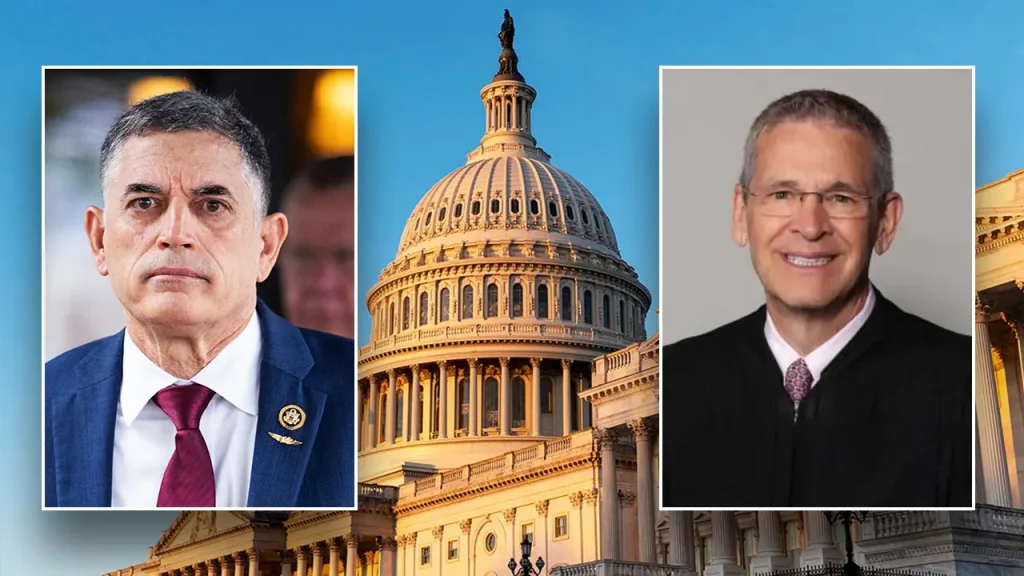In a significant political move, Georgia Republican representative Andrew Clyde has announced the introduction of impeachment articles against Chief U.S. District Judge John James McConnell Jr. of Rhode Island. The allegations center around claims that McConnell abused his judicial authority and exhibited conflicts of interest in relation to his rulings, particularly concerning federal funding. This legal maneuver reflects ongoing tensions between the judiciary and the Trump administration, as Clyde asserts that McConnell’s actions obstruct the will of the American people.
| Article Subheadings |
|---|
| 1) Overview of Impeachment Charges Against Judge McConnell |
| 2) Clyde’s Justification for Impeachment |
| 3) Legal Context: The Role of the Judiciary |
| 4) Broader Implications for Judicial Independence |
| 5) Responses from Judicial Leaders and Lawmakers |
Overview of Impeachment Charges Against Judge McConnell
The articles of impeachment against Judge John James McConnell Jr. have gained traction following accusations that he has misused his judicial position. Specifically, these articles contend that he engaged in “abuse of power” by issuing rulings which align with his personal political beliefs, undermining the integrity of the rule of law. The context of these charges arises primarily from a lawsuit involving 22 states and the District of Columbia against the Trump administration, where McConnell ordered the unfreezing of federal funds that had been withheld. His rulings prompted significant backlash from conservative circles, labeling his actions as a form of judicial activism.
Clyde’s Justification for Impeachment
Representative Andrew Clyde has articulated clear reasons behind the decision to introduce these impeachment articles. He asserts that the American electorate expressed a strong preference for President Trump’s policies, thereby providing a mandate that he believes McConnell is actively undermining. In Clyde’s view, McConnell’s judicial decisions represent a failure to honor this mandate, an assertion he backed by stating, “Judge McConnell, who stands to benefit from his own injunction, is attempting to unilaterally obstruct the president’s agenda and defy the will of the American people.” Clyde’s statements highlight a broader concern among Trump supporters about judicial overreach.
Legal Context: The Role of the Judiciary
The impeachment effort against Judge McConnell reflects a growing trend where political beliefs significantly intersect with judicial rulings. This case presents a pivotal moment in American politics, calling into question the boundaries of judicial authority and political accountability. McConnell’s orders—prompting challenges from the federal government—emphasize an ongoing legal battle over how much power should rest within the judicial branch, particularly regarding executive actions. As Clyde leads this impeachment initiative, it signifies a drive towards recalibrating the balance of power among branches of government, a cornerstone of American democracy.
Broader Implications for Judicial Independence
The implications of Clyde’s impeachment articles extend beyond a single case against Judge McConnell. They raise essential queries regarding the independence of the judiciary, as political pressures can threaten judges who pursue rulings based on interpretations of the law rather than aligning with prevailing political climates. The impeachment resolution is positioned as a warning to judges nationwide. Critics argue that this could set a precedent, making it more likely for judges to face repercussions based on partisan disagreements, which in turn would undermine the judiciary’s role as an impartial arbiter.
Responses from Judicial Leaders and Lawmakers
As the impeachment articles gain attention, judicial leaders and lawmakers are voicing their concerns. Prominent figures, including U.S. Supreme Court Chief Justice John Roberts, have articulated that impeachment should not be considered a suitable response to dissatisfaction with judicial decisions. In an unusual statement, Roberts said, “For more than two centuries, it has been established that impeachment is not an appropriate response to disagreement concerning a judicial decision.” His comments highlight an essential distinction between legal versus political grievances, an integral part of maintaining the checks and balances foundational to the U.S. governance system.
| No. | Key Points |
|---|---|
| 1 | Rep. Andrew Clyde introduced impeachment articles against Judge John McConnell. |
| 2 | Clyde alleges McConnell abused his judicial authority by politicizing his rulings. |
| 3 | The ongoing lawsuit against the Trump administration led to McConnell ordering the unblocking of federal funds. |
| 4 | Clyde argues that McConnell’s actions obstruct the will of the American people. |
| 5 | Judicial leaders caution against political retaliation in the form of impeachment against judges. |
Summary
The introduction of impeachment articles against Judge John James McConnell Jr. illustrates the mounting tensions between governmental branches, particularly as it relates to the judicial authority’s involvement in political affairs. Representative Andrew Clyde‘s actions may serve as a precedent that challenges the independence of the judiciary, raising concerns among judicial leaders about the potential ramifications for the rule of law. As this situation unfolds, it will likely elicit ongoing debate regarding the balance of power and the integrity of judicial independence in the face of political pressures.
Frequently Asked Questions
Question: What prompted the impeachment of Judge McConnell?
The impeachment articles were introduced by Rep. Andrew Clyde citing abuse of power and conflicts of interest related to McConnell’s judicial decisions, particularly pertaining to federal funding disputes.
Question: How does this situation reflect on judicial independence?
The impeachment effort shows a concerning trend where judicial rulings are increasingly perceived as politically motivated, which could threaten the principle of judicial independence vital for fair governance.
Question: What is the perspective of judicial leaders regarding the impeachment move?
Judicial leaders, including Chief Justice John Roberts, assert that impeachment should not be a response to disagreements over judicial decisions, emphasizing the importance of maintaining an independent judiciary free from political influence.
